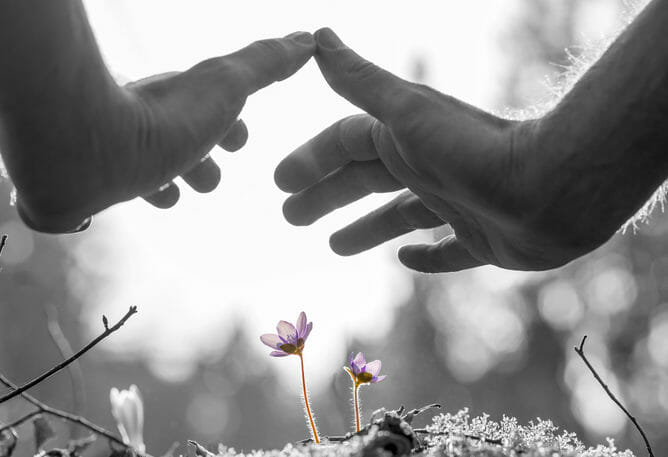Yesterday during a webinar we were talking about how challenging it can be to trust our goodness or potential when we’re overeating.
Food ‘stuff’ can bring up so much shame and self attack: we can feel so broken or discouraged for not being able to do better.
When we feel disconnected from our inherent innocence – no one is born choosing to become hurt, traumatized or addicted – it can be hard to trust that the yearning to grow lives within us, that our development has its own longing.
Master therapist Carl Rogers tells a beautiful story in his book, A Way of Being, that illustrates this idea. His family kept seed potatoes in the basement – seed potatoes are potatoes you plant, like seeds, that become new potato plants. The potatoes were in a dark bin, far away from the light. And yet the plants sent shoots of new life up towards the tiny window at the top of the ceiling.
We’re like those plants. We’re always becoming, leaning towards the light. The rivers within are always looking for the channels where they can flow.
We don’t always trust this aliveness. And when we get hurt, it can feel covered over or inaccessible, like it’s been buried beneath too much stone to survive.
The worry and frustration of feeling behind or ‘unhealed’
When we’re face to face with our vulnerability and our wounds, it’s easy to feel worried and impatient, to see nothing in ourselves but thorn, weeds or a steaming pile of rotting compost.
And we can feel so alarmed when we’re stuck in food or other addictions!
We may fear that if we aren’t pushing or forcing our growth that it won’t happen, so ‘distant from the hope of ourselves,’ as poet Mary Oliver writes.
In our classes, I invite us to settle into this idea that our development longs to unfold, that we can trust our yearning to become, and that our bodies long to heal. In the same way that they know how to heal a cut or a broken bone, they also know how to repair when we get emotionally hurt.
Opening to this idea is a relaxing back into grace: trusting that our journey’s carrying us, rather than the other way around.
Connecting with nature can soften your worries about healing
This is easy to say. Not so easy to know or to trust.
This is where nature can help.
For those of you in the Northern Hemisphere, it’s spring, a season when we’re surrounded by new life. We have new potato plants, lettuces, and tomatoes in the garden.
When I feel separate from hope, trust, or from the goodness of myself, I go to the earth. Like the Buddha, this is where we can answer that fundamental question of scorn and self doubt: Who do you think you are?
Why, we’re a part of the living world.
When I visit my garden, often in the mornings, something in me settles as I take in the plants: ah, I’m not separate from this life. I’m a part of it, and it’s a part of me. The life force in these plants also lives in me.
I feel a bit of hope – but it’s not hope attached to any of my doing, or to an outcome. It’s a hope that resides in this beingness of life.
Remembering our belonging
When we immerse ourselves in nature, we immerse ourselves in the cycles of earth. We feel settled and less anxious and feel more trust towards our seeds – and maybe a little more accepting of the compost.
We’re reminded that we, too, are mineral and vegetable, soil and seed, root and bloom.
And just as we’re plant and seed, we’re also each season: spring and summer, winter and fall. Each season of the journey belongs, as you belong – whether you’re sprouting into new life, blooming into great fruit, falling apart as compost, or fallow and at rest.
Being in nature helps us remember and reconnect into this belonging, that we’re a part of the natural world. When you feel alarmed, stuck, worried, or overwhelmed by self judgment about your ‘lack of progress’ or being ‘behind,’ you might try spending some time close to the earth.
How does this change how you see yourself? How does this change how you see your healing? Does it soften any alarm or urgency about needing to fix yourself?
Immersing ourselves in the ground of earth, and immersing ourselves in the cycles of growth softens the mechanical view of healing and growth as a linear line that we have to make happen.
This helps us relax back into life, and into the hands that hold our healing. These hands, thank goodness, are kind.
Holding our seeds of growth in compassion
I’ll close with a poem I wrote this week after our garden seeds failed to sprout. Growing food is a process of learning, humility, and trying again – and feeding lots of bugs!
May we hold ourselves with as much compassion and understanding as we do our seeds.
Sprouting seeds
Holding a tray of new pepper plants I asked
her how she did it. She patiently explained
the requirements of seeds: warm light
to coax them from their dark caves, steady
moisture to crack the heart seam down the middle
a fan of blowing wind to create sturdy limbs
and generous space for roots to spread
their dancing fingers. I thought planting,
water and sunlight were enough. Now
I understood why my seeds had failed to bloom.
As I walked away I wondered: when seeds
don’t sprout, we don’t blame the plant. So
why do we do this to ourselves
and to each other?
